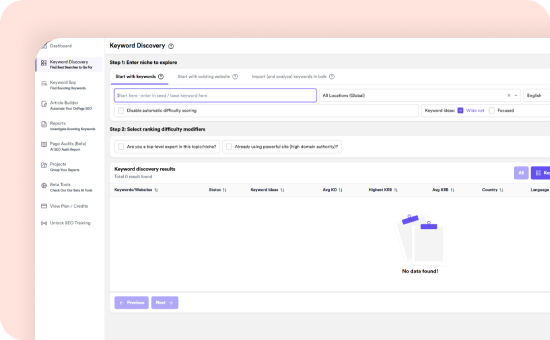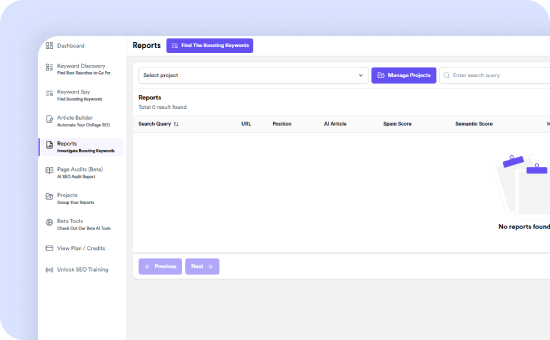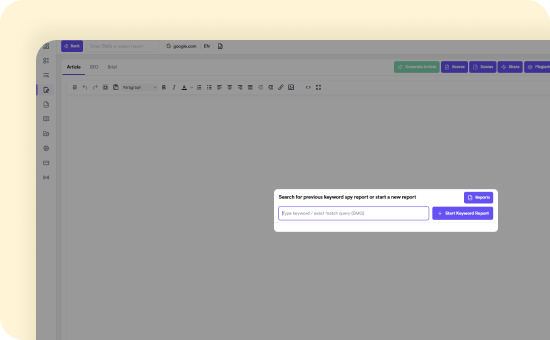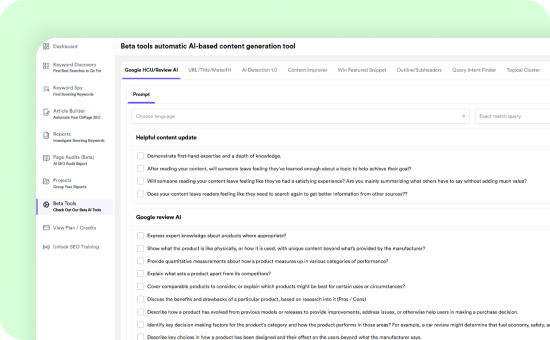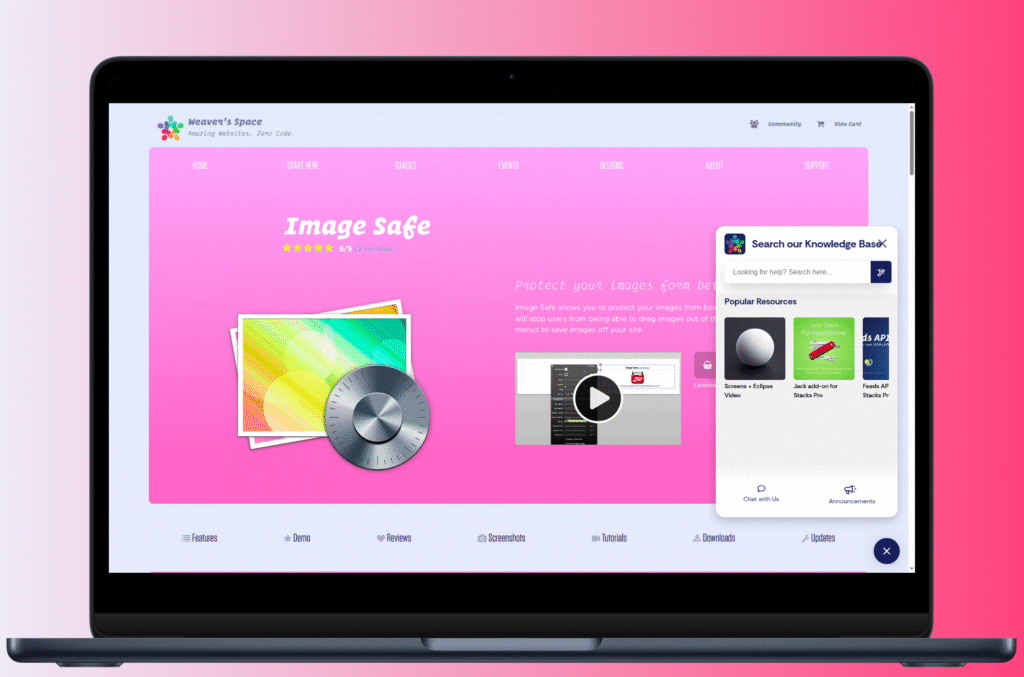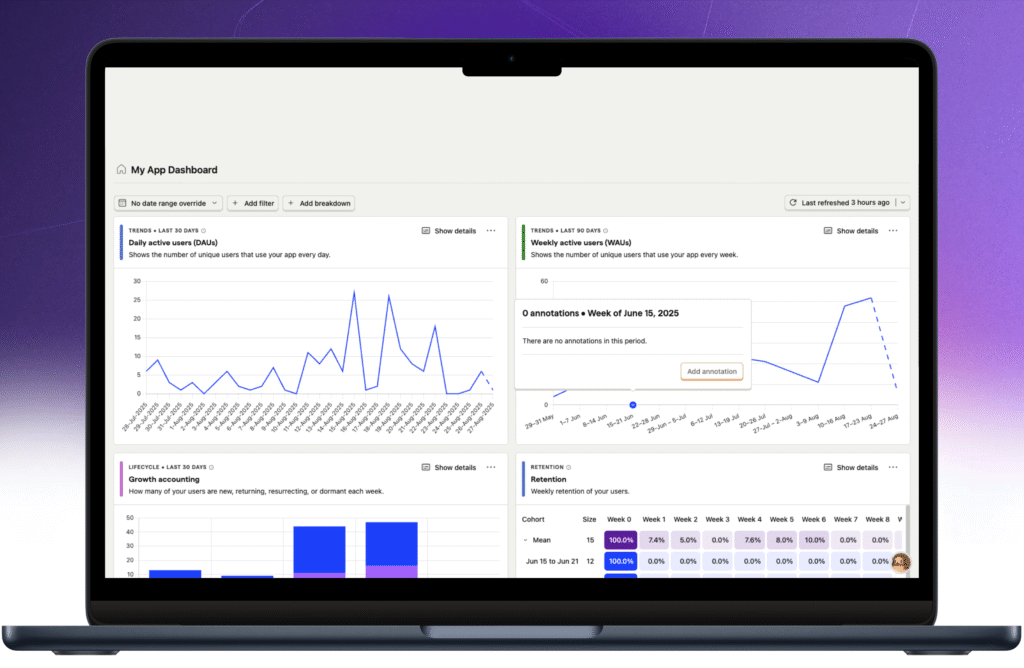Esketchers developed an advanced AI-powered platform to streamline and enhance on-page SEO and content generation. This innovative tool lets users discover profitable niches, optimize keyword strategies, analyze competitors, and generate high-quality, search-engine-optimized content. With features like automated SEO recommendations, AI-driven content creation, and competitor analysis, the platform empowers businesses to boost their online visibility and achieve measurable growth in their digital presence.
AI-Powered SEO & Content Automation Platform
AI-Powered SEO & Content Automation Platform
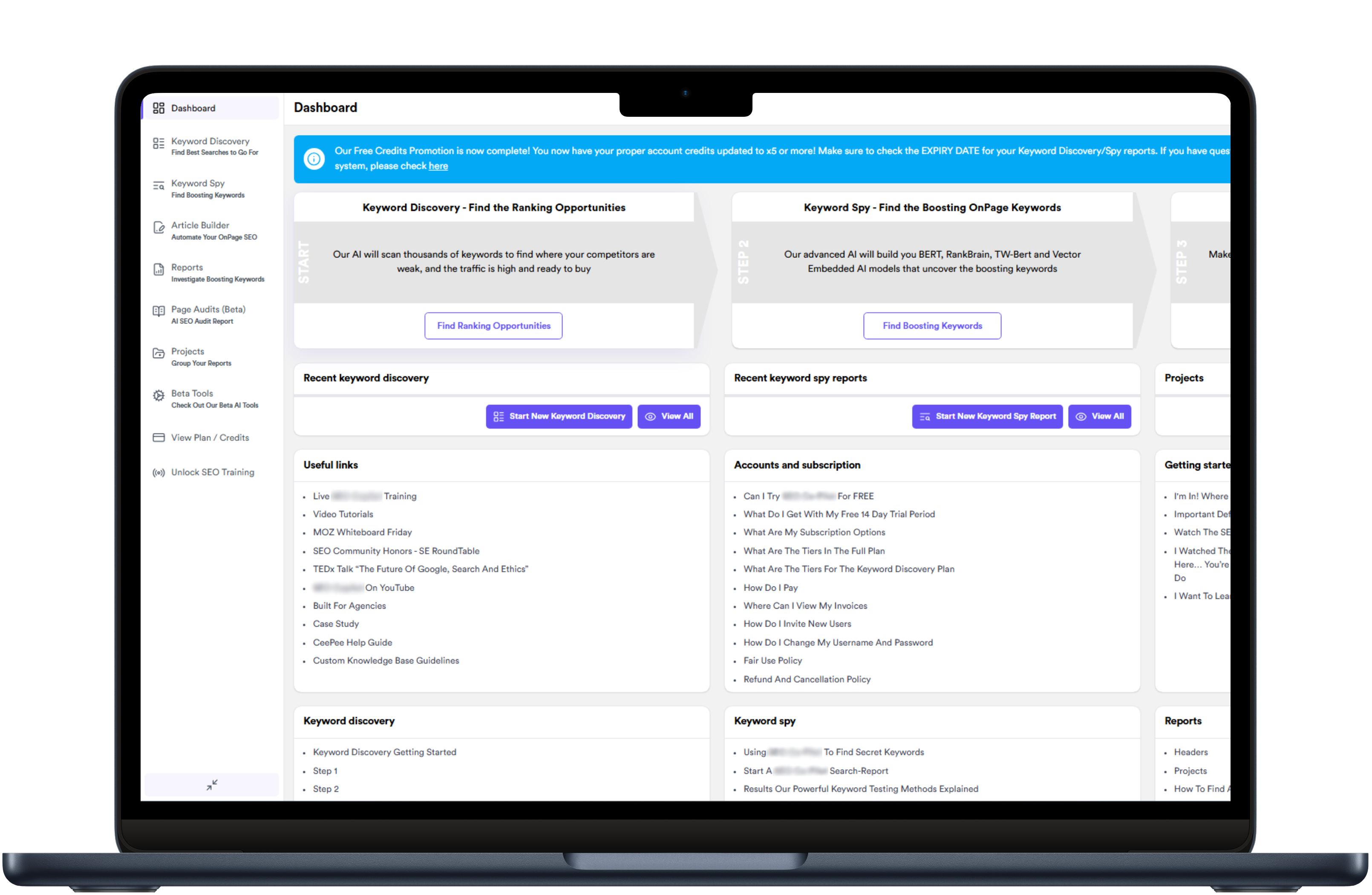
Problem
On-page SEO and content creation are critical but time-consuming tasks for businesses aiming to boost their online visibility. Many struggle to identify profitable niches, optimize keywords effectively, analyze competitors, and produce high-quality, SEO-optimized content at scale. These challenges often lead to inefficiencies, inconsistent results, and missed opportunities for organic traffic growth. There was a clear need for an automated, reliable, and scalable solution to simplify and streamline these processes, enabling users to achieve measurable results with less effort and resources.
Solution
To address these challenges, we developed a comprehensive SaaS platform that uses AI to automate and optimize on-page SEO and content creation. The platform provides:
Use Cases
Team
Services we offered
Market Specifics
Deliverables
Client Goals
The client wanted to develop a robust AI-powered SaaS platform that would simplify and automate the complexities of on-page SEO and content creation. Their goals included:
Streamline SEO Processes
Create a solution that reduces the time and effort required for SEO tasks, making them accessible to users with varying levels of expertise.
Enhance Keyword Strategies
Enable users to discover high-ranking keywords and optimize their content for improved search engine visibility.
Provide Actionable Insights
Develop tools to offer deep competitor analysis and market insights, helping users stay ahead in their niche.
Automate Content Creation
Build an AI-driven system capable of generating high-quality, SEO-optimized content at scale, reducing reliance on manual efforts.
Deliver Analytics and Reporting
Integrate advanced analytics to provide real-time performance tracking, enabling users to measure the success of their SEO efforts and make data-driven decisions.
Ensure Scalability and Usability
Design a user-friendly and scalable platform that can cater to many businesses, from small startups to large enterprises.
Target audience
Digital Marketers
Content Creators and Bloggers
Small and Medium Businesses (SMBs)
E-Commerce Businesses
SEO Agencies
Startups
Freelancers
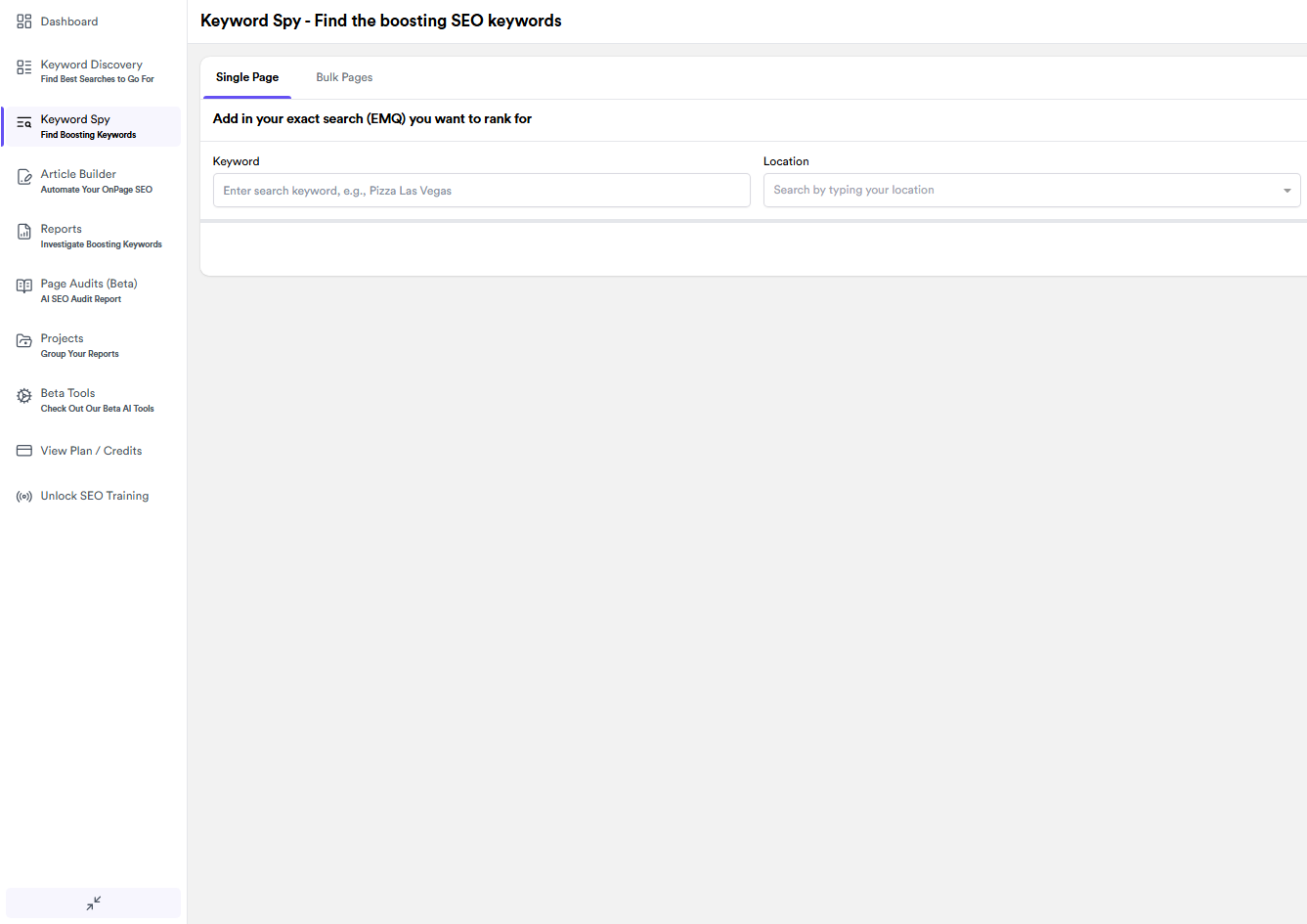
Core Features
Niche Discovery
Identify profitable niches and untapped opportunities using AI-powered insights to target the right audience effectively.
Keyword Optimization
Advanced tools for researching, analyzing, and recommending keywords to boost search engine rankings and drive organic traffic.
Competitor Analysis
Comprehensive competitor insights, including keyword rankings, content strategies, and market trends, to stay ahead in the industry.
AI-Driven Content Creation
Generate high-quality, SEO-optimized articles, blogs, and web content at scale with minimal manual input.
On-Page SEO Automation
Automated suggestions and solutions for optimizing metadata, headings, images, and other on-page elements to improve rankings.
User-Friendly Interface
Intuitive dashboard and workflows that simplify complex SEO tasks, making the platform accessible to users of all skill levels.
Scalability
A robust platform designed to support businesses of all sizes, from individual entrepreneurs to large agencies managing multiple clients.
Performance Tracking and Analytics
Real-time monitoring and detailed reporting on SEO performance, including keyword rankings, traffic metrics, and content effectiveness.
Additional features
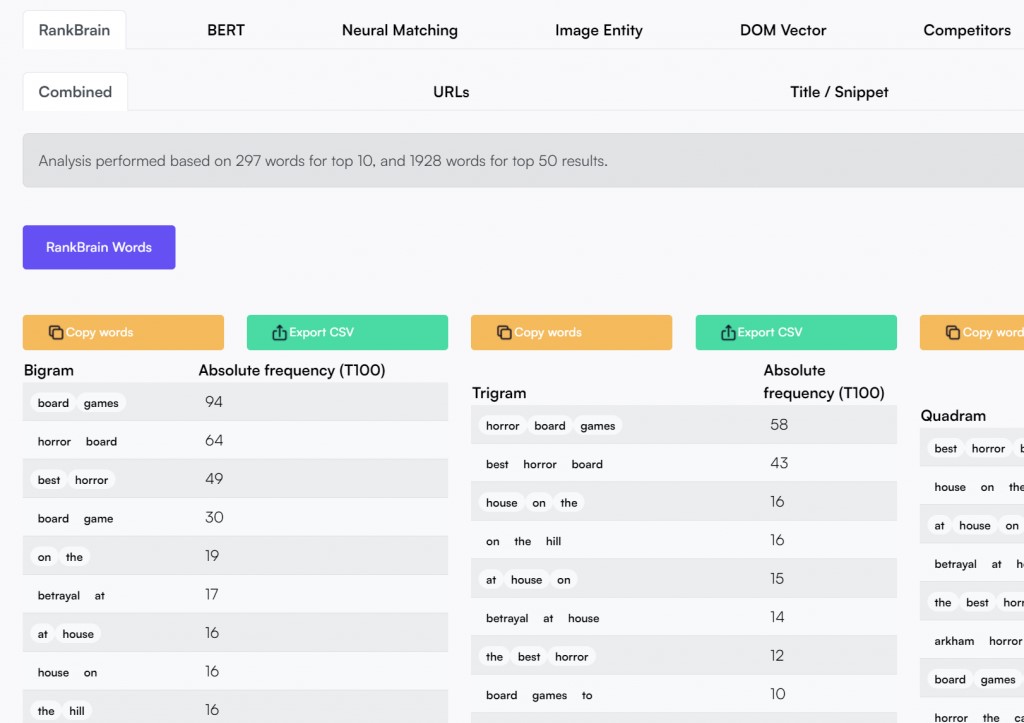
Content Idea Generation
AI-driven suggestions for trending topics and content ideas tailored to user niches and target audiences.
Plagiarism Checker
Built-in tools to ensure generated content is unique and free of plagiarism for higher credibility and SEO compliance.
AI Writing Style Detection
Identify and refine AI-generated content to meet industry standards and ensure it resonates with human readers.
Multilingual Support
Generate and optimize content in multiple languages to cater to global audiences and expand reach.
Competitor Keyword Gap Analysis
Discover keywords for which competitors are ranking but missing from the user’s content strategy.
Content Performance Insights
Detailed metrics on how published content is performing, helping users identify areas for improvement.
Collaboration Tools
Features for team collaboration, including content sharing, review workflows, and role-based access control.
Achievements
Streamlined SEO Processes
The platform has significantly reduced the complexity and time involved in optimizing on-page SEO, making it easier for users to achieve their goals.
Content Creation at Scale
Users can produce large volumes of high-quality, SEO-friendly content quickly, boosting their productivity and online presence.
Improved Search Rankings
Businesses leveraging the platform have seen noticeable improvements in their keyword rankings, leading to higher visibility and more organic traffic.
Valuable Insights
By providing detailed competitor analysis and performance metrics, the platform has empowered users to make informed, strategic decisions.
Broad User Base
It has successfully catered to a diverse audience, including marketers, SEO agencies, e-commerce stores, and startups.
Positive Feedback
Users have praised the platform for its simplicity, robust functionality, and tangible results, strengthening its reputation in the market.
Scalable Solutions
Designed to meet the needs of businesses of all sizes, the platform has proven its ability to handle everything from basic SEO tasks to more complex requirements.
Analytics-Driven Growth
With real-time tracking and reporting tools, users have been able to optimize their SEO strategies continuously and see sustained progress.
Competitive Advantage
The platform has helped its users gain a clear edge over competitors by offering advanced tools and data-driven strategies.
Tech Stack
Front-End
Back-End
Deployment Strategy
Quality Assurance Strategies
To ensure the delivery of a high-quality platform, we implemented a robust set of Quality Assurance (QA) strategies throughout the development lifecycle. The following key strategies played a vital role in maintaining performance, security, and usability:
User-Centered Design Validation
We prioritized user feedback throughout the development cycle, conducting regular usability tests to ensure the platform is intuitive, accessible, and meets user needs.
Automated and Manual Testing
To maintain high reliability, we combined automated testing for repetitive tasks like regression checks with manual testing for more complex workflows and edge cases.
AI Content Accuracy Checks
We designed specialized tests to validate the quality of AI-generated content, ensuring it meets SEO standards, is plagiarism-free, and aligns with user expectations.
Scalability and Performance Testing
The platform underwent rigorous load testing to confirm it could handle high volumes of data and user activity without compromising speed or functionality.
Regular Updates and Bug Fixes
A highly skilled QA expert monitors platform performance and user feedback post-launch, ensuring that updates are rolled out to address any issues promptly and maintain continuous improvement.
Cross-Browser and Device Compatibility
To reach a wider audience, we tested the platform across various browsers and devices to ensure a consistent user experience everywhere.
Team Collaboration
Developers, designers, and testers worked closely throughout the project to identify and address potential quality issues early, ensuring a smooth development process.
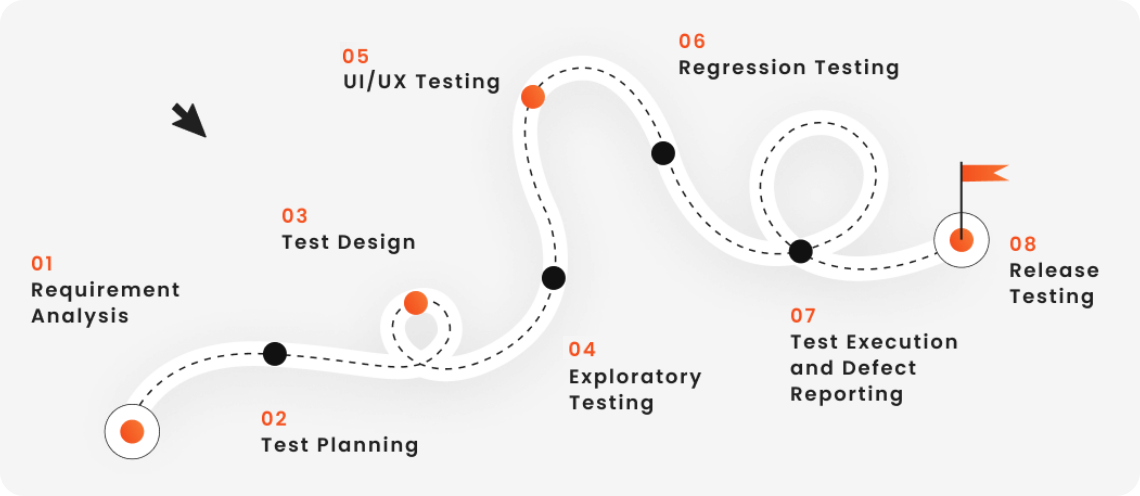
Testing Methodology
Requirement Analysis
- Collaborated with stakeholders to identify key features and user expectations.
- Defined functional and non-functional requirements for clear testing objectives.
Integration Testing
- Verified smooth interaction between different modules, such as keyword analysis, competitor research, and content generation.
Functional Testing
- Tested all features against the defined requirements to ensure they perform as intended.
Performance Testing
- Conducted load and stress tests to validate platform scalability and response times under heavy traffic.
Cross-Platform and Browser Testing
- Ensured the platform works seamlessly on various devices and browsers.
Regression Testing
- After updates or fixes, re-tested to confirm existing features remained functional and unaffected.
Bug Reporting and Resolution
- Logged issues systematically and ensured prompt resolution with retesting for confirmation.
Final Validation
- Conducted a thorough review of all features and functionalities before deployment to ensure readiness.
Why we use this particular methodology?
We chose the Agile Scrum methodology because it fits projects that need flexibility and quick adjustments. AI and SEO evolve fast, so we needed a method that allowed us to adapt quickly.
Frequent Feedback
We collected client and user feedback often, improving the product step by step.
Manage Complexity
Broke down big features like AI content creation into smaller, easier tasks.
Continuous Testing
Tested every sprint to maintain high quality.
Faster Delivery
Released useful features early instead of waiting for the full product.
Project Management
Agile Methodology
Used Agile methodology to allow flexible planning and adapt to changes quickly.
User Feedback
Collected user input regularly and made improvements based on it.
Team Collaboration
Developers, designers, and testers worked together closely.
Tools Used
Managed tasks with Asana, communicated through Skype.
Scrum Process
Held daily check-ins, planned sprints, and reviewed progress regularly.
Planning
Carefully schedule tasks, assign resources, and set clear milestones to meet deadlines.
